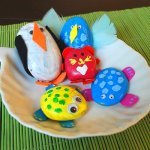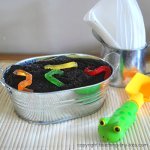Toddler Books Introduces the Caldecott Medal Winners
If you are seeking noteworthy toddler books, this is a list that may give you a few ideas. Throughout my years in teaching I have collected and used quite a few of these books in daily reading, classroom libraries, and with literature units I have developed.
Caldecott Medal Winners
- 2021 - We Are Water Protectors illustrated by Michaela Goade, written by Carole Lindstrom
- 2020 - The Undefeated illustrated by Kadir Nelson, written by Kwame Alexander
- 2019 - Hello Lighthouse illustrated and written by Sophie Blackall
- 2018 - Wolf in the Snow by Matthew Cordell
- 2017 - Radiant Child: The Story of Young Artist Jean-Michel Basquiat by Javaka Steptoe
- 2016 - Finding Winnie: The True Story of the World’s Most Famous Bear by Lindsay Mattick
- 2015 - The Adventures of Beekle: The Unimaginary Friend by Dan Santat
- 2014 - Locomotive
- 2013 - This is Not My Hat by Jon Klassen
- 2012 - A Ball for Daisy by Chris Raschka
- 2011 - A Sick Day for Amos McGee by Philip C. Stead
- 2010 - The Lion and the Mouse by Jerry Pinkney
- 2009 - The House in the Night by Beth Krommes
- 2008 - The Invention of Hugo Cabret by Brian Selznick
- 2007 - Flotsam by David Wiesner
- 2006 - The Hello, Goodbye Window, by Norton Juster
- 2005 - Kitten's First Full Moon by Kevin Henkes
- 2004 - The Man Who Walked Between the Towers by Mordicai Gerstein
- 2003 - My Friend Rabbit by Eric Rohmann
- 2002 - The Three Pigs by David Wiesner
- 2001 - So You Want to Be President? by Judith St. George
- 2000 - Joseph Had a Little Overcoat by Simms Taback
- 1999 - Snowflake Bentley by Jacqueline Briggs Martin
- 1998 - Rapunzel by Paul O. Zelinsky
- 1997 - Golem by David Wisniewski
- 1996 - Officer Buckle and Gloria by Peggy Rathmann
- 1995 - Smoky Night, by Eve Bunting
- 1994 - Grandfather's Journey by Allen Say
- 1993 - Mirette on the High Wire by Emily Arnold McCully
- 1992 - Tuesday by David Wiesner
- 1991 - Black and White by David Macaulay
- 1990 - Lon Po Po: A Red-Riding Hood Story from China by Ed Young
- 1989 - Song and Dance Man by Karen Ackerman (Knopf)
- 1988 - Owl Moon by Jane Yolen
- 1987 - Hey, Al by Arthur Yorinks
- 1986 - The Polar Express by Chris Van Allsburg
- 1985 - Saint George and the Dragon retold by Margaret Hodges
- 1984 - The Glorious Flight: Across the Channel with Louis Bleriot by Alice and Martin Provensen
- 1983 - Shadow translated and illustrated by Marcia Brown Original text in French by Blaise Cendrars
- 1982 - Jumanji by Chris Van Allsburg
- 1981 - Fables by Arnold Lobel
- 1980 - Ox-Cart Man by Donald Hall
- 1979 - The Girl Who Loved Wild Horses by Paul Goble
- 1978 - Noah's Ark by Peter Spier
- 1976 - Why Mosquitoes Buzz in People's Ears retold by Verna Aardema
- 1975 - Arrow to the Sun by Gerald McDermott
- 1974 - Duffy and the Devil retold by Harve Zemach
- 1973 - The Funny Little Woman retold by Arlene Mosel
- 1972 - One Fine Day retold by Nonny Hogrogian
- 1971 - A Story A Story retold by Gail E. Haley
- 1970 - Sylvester and the Magic Pebble by William Steig
- 1969 - The Fool of the World and the Flying Ship retold by Arthur Ransome (Farrar)
- 1968 - Drummer Hoff adapted by Barbara Emberley
- 1967 - Sam, Bangs and Moonshine by Evaline Ness
- 1966 - Always Room for One More by Sorche Nic Leodhas, pseud. [Leclair Alger]
- 1965 - May I Bring a Friend? by Beatrice Schenk de Regniers
- 1964 - Where the Wild Things Are by Maurice Sendak (Children's book awards winner AND a best seller of the 20th century)
- 1963 - The Snowy Day by Ezra Jack Keats
- 1962 - Once a Mouse, retold and illustrated by Marcia Brown
- 1961 - Baboushka and the Three Kings by Ruth Robbins
- 1960 - Nine Days to Christmas by Marie Hall Ets and Aurora Labastida
- 1959 - Chanticleer and the Fox by adapted from Chaucer's Canterbury Tales by Barbara Cooney
- 1958 - Time of Wonder by Robert McCloskey
- 1957 - A Tree is Nice by Janice Udry
- 1956 - Frog Went A-Courtin' retold by John Langstaff
- 1955 - Cinderella, or the Little Glass Slipper translated from Charles Perrault by Marcia Brown
- 1954 - Madeline's Rescue by Ludwig Bemelmans
- 1953 - The Biggest Bear by Lynd Ward
- 1952 - Finders Keepers by Will, pseud. [William Lipkind]
- 1951 - The Egg Tree by Katherine Milhous
- 1950 - Song of the Swallows by Leo Politi
- 1949 - The Big Snow by Berta & Elmer Hader
- 1948 - White Snow, Bright Snow by Alvin Tresselt
- 1947 - The Little Island by Golden MacDonald, pseud. [Margaret Wise Brown]
- 1946 - The Rooster Crows by Maude & Miska Petersham
- 1945 - Prayer for a Child by Rachel Field
- 1944 - Many Moons by James Thurber
- 1943 - The Little House by Virginia Lee Burton
- 1942 - Make Way for Ducklings by Robert McCloskey (Children's book awards winner AND a best seller of the 20th century)
- 1941 - They Were Strong and Good, by Robert Lawson
- 1940 - Abraham Lincoln by Ingri & Edgar Parin d'Aulaire
- 1939 - Mei Li by Thomas Handforth
- 1938 - Animals of the Bible, A Picture Book selected by Helen Dean Fish
How the Caldecott Medal Came to Be
The Caldecott Medal was named in honor of nineteenth-century English illustrator Randolph Caldecott. It is awarded annually by the Association for Library Service to Children, a division of the American Library Association, to the artist of the most distinguished American picture book for children.Each year the Newbery Medal is awarded by the American Library Association for the most distinguished American children's books published the previous year. However, as many persons became concerned that the artists creating picture books for children were as deserving of honor and encouragement as were the authors of children's books.
The Caldecott Medal "shall be awarded to the artist of the most distinguished American Picture Book for Children published in the United States during the preceding year. The award shall go to the artist, who must be a citizen or resident of the United States, whether or not he be the author of the text. Members of the Newbery Medal Committee will serve as judges. If a book of the year is nominated for both the Newbery and Caldecott Awards the committee shall decide under which heading it shall be voted upon, so that the same title shall not be considered on both ballots." In 1977 the Board of Directors of the Association for Library Service to Children rescinded the final part of the 1937 action and approved that "any book published in the preceding year shall be eligible to be considered for either award or both awards." Separate committees to choose the Newbery and Caldecott Awards were established in 1978 and began with the 1980 selection committees.
American Library Association



